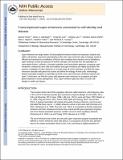Super-Enhancers in the Control of Cell Identity and Disease
Author(s)
Hnisz, Denes; Abraham, Brian Joseph; Lee, Tong Ihn; Lau, Ashley; Saint-Andre, Violaine; Sigova, Alla A.; Hoke, Heather Ashley; Young, Richard A.; ... Show more Show less
DownloadYoung_Super-enhancers.pdf (2.574Mb)
PUBLISHER_CC
Publisher with Creative Commons License
Creative Commons Attribution
Terms of use
Metadata
Show full item recordAbstract
Super-enhancers are large clusters of transcriptional enhancers that drive expression of genes that define cell identity. Improved understanding of the roles that super-enhancers play in biology would be afforded by knowing the constellation of factors that constitute these domains and by identifying super-enhancers across the spectrum of human cell types. We describe here the population of transcription factors, cofactors, chromatin regulators, and transcription apparatus occupying super-enhancers in embryonic stem cells and evidence that super-enhancers are highly transcribed. We produce a catalog of super-enhancers in a broad range of human cell types and find that super-enhancers associate with genes that control and define the biology of these cells. Interestingly, disease-associated variation is especially enriched in the super-enhancers of disease-relevant cell types. Furthermore, we find that cancer cells generate super-enhancers at oncogenes and other genes important in tumor pathogenesis. Thus, super-enhancers play key roles in human cell identity in health and in disease.
Date issued
2013-11Department
Massachusetts Institute of Technology. Department of Biology; Whitehead Institute for Biomedical ResearchJournal
Cell
Publisher
Elsevier
Citation
Hnisz, Denes, Brian J. Abraham, Tong Ihn Lee, Ashley Lau, Violaine Saint-André, Alla A. Sigova, Heather A. Hoke, and Richard A. Young. “Super-Enhancers in the Control of Cell Identity and Disease.” Cell 155, no. 4 (November 2013): 934–947.
Version: Author's final manuscript
ISSN
00928674